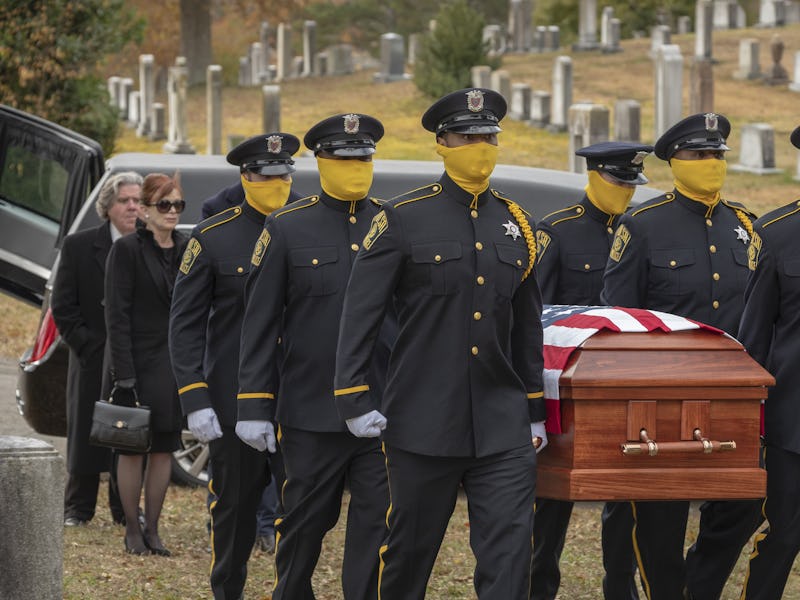A huge 'Watchmen' Easter egg fuels a Rorschach/Seventh Cavalry theory
For thirty years, Rorschach's journal has influenced the world of 'Watchmen' in big and small ways.

A major Easter egg in Sunday night’s Watchmen on HBO fuels a theory about Rorschach and the Seventh Calvary that, for all the very obvious evidence, has yet to be made explicit and clear. This being a Damon Lindelof show, probably nothing will ever be clear, but it’s fun to connect the dots anyway.
Spoilers for Watchmen Episode 03, “She Was Killed by Space Junk,” ahead.
In the third episode of the HBO series, viewers finally meet FBI agent Laurie Blake, played by Jean Smart. Readers of the original Watchmen by Alan Moore and Dave Gibbons will recognize her. It’s none other than the Silk Spectre herself, Laurie Jupiter.
Jean Smart plays Laurie Blake in 'Watchmen' on HBO.
Decades ago in events that preceded the comic, Laurie fought crime dressed up as Silk Spectre, an identity she took up from her mother, Sally Jupiter of the Minutemen. Laurie herself was part of the Watchmen in the ‘70s, alongside Dr. Manhattan, The Comedian, Rorschach, and the second Nite-Owl.
But now, in 2019, Laurie works for federal law enforcement cracking down on masked vigilantes. Her newest case: The Seventh Cavalry, a group of masked white nationalists in Tulsa, Oklahoma, who’ve adopted Rorschach’s mask as symbols for themselves. As is explained in the episode, the Cavalry formed after President Robert Redford passed the Victims of Racial Violence Act, which has the nickname “Redfordations.” (A play on reparations.) Laurie’s FBI superior calls the Cavalry, “just the Klan with different masks.”
About twelve minutes into the episode, Laurie attends an FBI meeting where she’s given her assignment. But a series of slides is interrupted by a page from Rorschach’s journal, included without permission by Dale (Dustin Ingram), an FBI rookie and academic who aids Laurie in Tulsa.
“The Cavalry wears his mask, sir,” Dale nervously explains. “I just thought, for psychological context…” His superior interrupts him, saying, “Who gives a shit about Rorschach? Next slide.”
Rorschach's journal, seen in the third episode of HBO's 'Watchmen.' The journal is taken directly from the comic, down to some of the exact quotes.
The Easter egg is that the journal isn’t only from Rorschach’s journal, it quotes Rorschach from the comic almost verbatim. And unfortunately for the short-sighted FBI, the kid is onto something. Because Rorschach’s journal has very clear direct ties to white conservatism in Watchmen, based on the final pages illustrated in the original graphic novel.
October 13, 1985
“First visit of the evening fruitless. Nobody knew anything. Feel slightly depressed. The city is dying of rabies. Is the best I can do to wipe random flecks of foam from its lips? Never despair. Never surrender. I leave the human cockroaches to discuss their heroin and child pornography. I have business elsewhere with a better class of person.”
Rorschach's journal, quoted in the series, from the original 'Watchmen' by Alan Moore and Dave Gibbons.
October 13, 1985, 8:30 p.m.
“Meeting with Veidt left bad taste in mouth. He is pampered and decadent, betraying even his own shallow, liberal affections. Possibly homosexual? Must investigate further.”
Again from the 'Watchmen' graphic novel, featuring pieces of Rorschach's journal.
How Watchmen ended
At the end of Watchmen, Adrian Veidt, (aka, Ozymandias) succeeded in dropping an exploding alien squid monster on New York City, killing millions. The catastrophe united the world and put an end to the Cold War, though as Doctor Manhattan told Veidt, “Nothing ends, Adrian. Nothing ever ends.”
In the final pages of the graphic novel, a far-right newspaper called the New Frontiersman — a favorite of Rorschach’s — discovers Rorschach’s journal in their mail pile. The eerily detailed journal laid out everything Rorschach knew about Veidt, the Comedian, the Watchmen, and more. And it was purposefully dropped off by Rorschach to the Frontiersman before he went to Antartica to confront Veidt, where he was killed by Doctor Manhattan.
In the thirty years between the comic and the HBO series, Rorschach’s journal was published in The New Frontiersman and republished as a book, thus making everything Rorschach knew public knowledge. But it seems as if most of the world dismissed it as the ramblings of a lunatic from a radical, sketchy publication. Still, Rorschach’s associations with the Frontiersman turned white nationalists on to Rorschach, making him a folk hero even though series creator Damon Lindelof said Rorschach would have objected.
Rorschach’s legacy
The connection between Rorschach’s journal and the Seventh Cavalry is pretty obvious, though no one in the series has said out loud the journal inspired the Cavalry so far. While some hypothesize as such (like Dale), the rest of the world seems ready to dismiss it, or just plain not give a damn about how Rorschach inspired these white supremacist terrorists (see Dale’s FBI superior).
As Lindelof explained in interviews leading up to the premiere, the HBO series is a spiritual sequel and “remix” of the comic. The comic is canon, as evidenced by characters like Laurie, Veidt (played by Jeremy Irons, we think), and plenty more that will be revealed in upcoming episodes. But more than just a sequel, Watchmen takes the themes and story of the comic and gives them a 2019 spin.
As a god once told the smartest man in the world, nothing ever ends.
Watchmen airs Sundays at 9 p.m. Eastern on HBO.